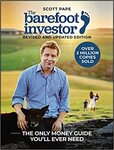SCOTT PAPE is the Barefoot Investor. Since 2002, he has reached millions of Australians through his email newsletter, national weekend newspaper columns and appearances on TV and radio. In 2014 Scott and his family lost everything in a bushfire?but what they did next?that?s the real story.
This Classic Edition has been updated for 2022 and beyond



 CamelCamelCamel
CamelCamelCamel
I took out $20k from my super during Covid and bet it all on red and guess what happened…